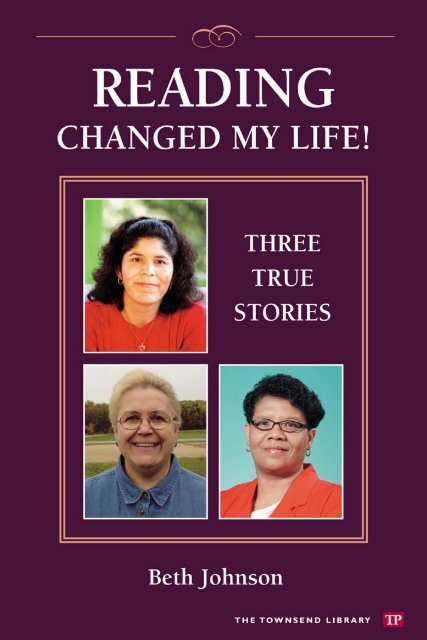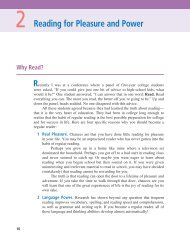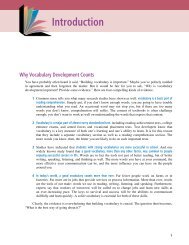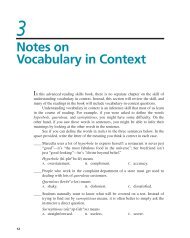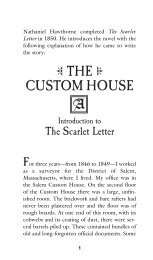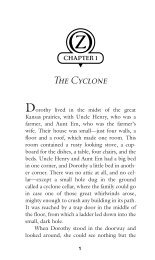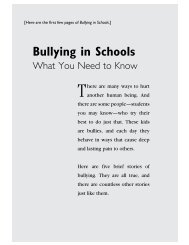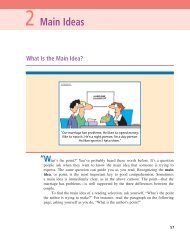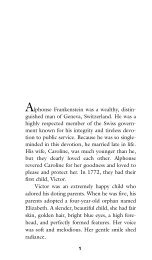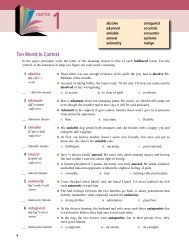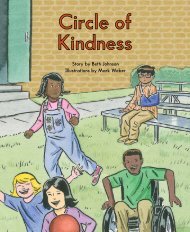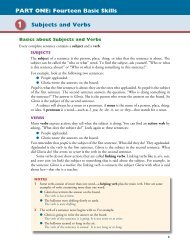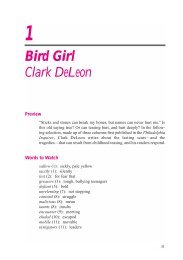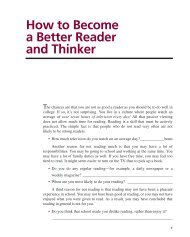Reading Changed My Life - Townsend Press
Reading Changed My Life - Townsend Press
Reading Changed My Life - Townsend Press
You also want an ePaper? Increase the reach of your titles
YUMPU automatically turns print PDFs into web optimized ePapers that Google loves.
READINGCHANGED MY LIFE!THREETRUESTORIESBeth Johnson
<strong>Reading</strong> <strong>Changed</strong> <strong>My</strong> <strong>Life</strong>!Three True StoriesFor more titles in the <strong>Townsend</strong> Library,visit our website: www.townsendpress.comPhotography:Maria Cárdenas by Paul KowalDaisy Russell by Beth JohnsonJulia Burney by Mark HertzbergCopyright © 2003 by <strong>Townsend</strong> <strong>Press</strong>.Printed in the United States of America0 9 8 7 6 5 4 3 2 1All rights reserved. Any ten pages of this book may be reproducedwithout the written permission of the publisher. For permissionto reproduce more than ten pages, send requests to:<strong>Townsend</strong> <strong>Press</strong>, Inc.1038 Industrial DriveWest Berlin, New Jersey 08091ISBN 1-59194-012-5Library of Congress Control Number:2003102664ii
ContentsIntroduction ivMaria Cardenas1Daisy Russell33Julia Burney57A Special Offer95iii
IntroductionThe three women whose stories appear in thisbook have never met. They live in three differentstates: Florida, Missouri, and Wisconsin. They havemade their livings in different ways: one as a farmlaborer, one as a factory worker, and one as a policeofficer. They come from three different racialgroups: Hispanic, white, and African-American.But for all their differences, Maria Cárdenas,Daisy Russell, and Julia Burney share a very importantcharacteristic. Each knows how painful it is tobe a non-reader in today’s world. Two of themknow that pain from personal experience; the thirdknows it from observing the pain of those aroundher.These three women share other qualities as well.For one thing, each of them has lived with violence,abuse, and poverty. The bad things that have happenedto them are sometimes difficult to readabout. In spite of the pain they have suffered, theyhave each, in their different ways, said, “This stopsiv
Introductionwith me.” They have refused to do to others whatwas once done to them. They have taken hard,courageous steps to change their own lives for thebetter. And each of them has gone even further,reaching out to help improve the lives of thosearound them. All three of them have dedicatedthemselves to sharing the gift of reading.Maria, Daisy, and Julia are just three of the hundredsof thousands of people in this country whoselives have been affected by poor reading skills. Asurprisingly large number of Americans are what isoften called “functionally illiterate.” That is, theycannot read or write well enough to get along, orfunction, very well in today’s society. They mightnot be able to figure out the right dosage to takefrom a bottle of medicine, or completely fill out ajob application, or find an intersection on a map.Statistics about literacy in America reveal some sadfacts. Three out of four people receiving foodstamps have very poor reading skills. Forty-threepercent of the adults considered functionally illiteratelive below the poverty line. And seven out of tenprison inmates are functionally illiterate. These arev
<strong>Reading</strong> <strong>Changed</strong> <strong>My</strong> <strong>Life</strong>! Three True Storiesthe realities Julia Burney was thinking about whenshe said, “I knew from the time I was a little girlthat reading was power. . . . You cannot thrive inthis society without reading well. I arrest peoplewho are unable to read their rights, and I think howhopeless life must look for them.”The three women whose stories appear hereonce faced odds that must have seemed hopeless.But instead of giving up, they took responsibility forturning their lives around. Maria Cárdenas, DaisyRussell, and Julia Burney each recognized thepower that reading provides, and each has claimedthat power for her own.vi
Maria Cardenas
This page intentionally left blank
An orange marigold planted in a tin cup isn’tmuch. It’s just a spot of color, a touch of beauty.But to Maria Cárdenas, the marigold was precious.To understand why, you must know somethingabout Maria’s life.Maria was born in Mexico, the second oldest ofwhat were eventually eight children. When she wasfour, she went to live with an aunt and uncle. Hermother and father had left Mexico to becomemigrant workers in the United States. They hadpaid someone eight hundred dollars to smugglethem across the border. When Maria was seven, herparents sent for the children to join them in Texas.3
<strong>Reading</strong> <strong>Changed</strong> <strong>My</strong> <strong>Life</strong>! Three True StoriesMigrant workers can’t afford much of a childhood.Within a short time, little Maria was workingin the fields. Her days were filled with backbreakinglabor, hunger, bug bites, sickness, drunken mencursing and fighting, hands stained with tomatooils, scary snakes hiding among the crops, and constanttravel. She picked citrus fruit and cucumbersin Florida, potatoes in Tennessee, peppers in NorthCarolina, and tomatoes in Ohio and Indiana. Thefamily moved wherever the crops were ready.Their home was a room in whatever migrantcamp they were staying in. The word “home” isusually a warm, comforting one. But these roomsweren’t warm or comforting. They were very bare,just four walls, furnished with a two-burner gasstove that flared up in scary, unexpected ways. If thefamily was lucky, there were mattresses on the floor.Everything else was outside. The workerswashed their dishes outside, under a hose. Toiletswere holes in the ground, surrounded by flimsy4
Maria CardenasMaria enjoys working in the garden she’s created behind her home.walls. Cold showers were outside as well. Nowherethat Maria looked was there anything to feed herhungry mind and heart.So the marigold was important. The spring that5
<strong>Reading</strong> <strong>Changed</strong> <strong>My</strong> <strong>Life</strong>! Three True StoriesMaria was ten, she went with her mother to a fleamarket. Someone there was selling plants. Somehowshe begged enough change from her motherto buy just one of the seedlings. Planted tenderly inan empty soup can, the flower was the only thingthat Maria owned. Even the clothes on her backwere shared among several sisters, but the marigoldwas hers.She carried it during the long car trips andwatered it faithfully. As the family reached each newcamp, she placed it in a sunny spot. The little planttraveled with her for an entire season, from Floridato Tennessee and on to Ohio. She treasured it untilone night when her father and his friends weredrunk and somebody kicked it to pieces.That was typical of her father. Maria was sad, butshe knew better than to complain. Depending onhis mood, he would have either laughed at her orbeaten her. When Maria had first arrived in theUnited States, her father seemed concerned for his6
Maria Cardenaschildren. He enrolled them in school, made surethey had supplies of crayons and paper, and braggedto his friends that they were going to become educated.He needed them to learn English so that theycould translate his words to the grocer, the doctor,the police officer.But something happened to him as the yearswent on. His drinking grew heavier and heavier. Hisoccasional slaps at his wife turned into frequent, terriblebeatings. Soon he was hitting his children aswell. He stopped working altogether and spent hisdays sitting by the fields, drinking beer, watchinghis family work. The kids didn’t pick fast enough tosuit him, so he threw stones and vegetables at themand called them names. At the week’s end, he collectedeveryone’s pay.All the workers knew about him. “In a migrantcamp, like everywhere, you have an upper class anda lower class,” Maria says. “If your father was thecrew leader—the boss man—you were the rich kids.7
<strong>Reading</strong> <strong>Changed</strong> <strong>My</strong> <strong>Life</strong>! Three True StoriesYou had new clothes. Sometimes you even got togo to the movies. If your dad was an OK guy whoworked hard, you were in the middle class. But ifyour dad was the camp drunk, you were the bottomof the barrel. That was us: the trash of the trash.The crew leader’s kids wouldn’t even speak to us.When we ended up in the same schools, they pretendedthey didn’t know us.”Because of the family’s traveling, Maria hadnever gone to school very steadily. She would beenrolled now and then, here and there, for a fewweeks at a time. As her father grew more brutal, sheattended even less. When picking was heavy, shehad to stay home to work. If the younger childrengot sick, Maria was expected to care for them. Inthe camps she heard only Spanish, so her Englishskills weren’t very good. As a result, she fell furtherand further behind in her studies.“I don’t know how I got through elementaryschool, much less to high school,” Maria says. “I only8
Maria Cardenasknew how to add, subtract, and multiply. I couldread enough to help my mother fill out forms inEnglish, but not much more than that.” She didn’task for help. Her hard life had made Maria very shyand quiet. She did what she was told, speaking onlyin a whisper. At school, she was like a silent ghostsitting in the back of the room. “When the teachertold the class, ‘Read this book and write a report,’ Ijust didn’t do it,” she says. “I knew she wasn’t talkingto me.”Maria’s family smiles for the camera. From left are Jasmine, Korak,Maria, and Alfonso.9
<strong>Reading</strong> <strong>Changed</strong> <strong>My</strong> <strong>Life</strong>! Three True StoriesFinally, when she was 13, something happenedto change the course of Maria’s life. Her mother ranaway after two weeks of terrible beatings. She hadwarned the children that she might. When Mariawent to school the next day, she told a counselorwhat had happened. The counselor called thepolice, and Maria’s father was arrested and put injail. He never lived with the family again, althoughhe continued to harass them. Sometimes he wouldstand outside their house and yell at his wife,“You’re gonna be a prostitute. Those kids aregonna be no-good drug addicts and criminals.They’re gonna end up in jail.”As shy and quiet as Maria was, her father’s wordsstill enraged her. Somehow, a desire for learning anda better life was alive within her. She dreamed ofgetting an education, of wearing pretty clothes, ofdoing work that people respected. She didn’t knowhow she would ever achieve her dreams, but shedidn’t let them die.10
Maria CardenasNow that her father was gone, the family wasnot traveling so much anymore. Maria was able tostay in one school for a while. To her amazement, ateacher, Mrs. Mercer, began to pay special attentionto her. Mrs. Mercer seemed to like Maria andthought she was smart. She offered Maria a job inthe Western clothing store she and her husbandowned. Every Saturday Maria worked at the store,helping to translate for Spanish-speaking customers.She was paid twenty dollars. Proudly, she presentedthis money to her mother. “I thought, ‘I can actuallydo more than field work!’” she says today. Thatthought made her dreams seem a little closer toreality.Maria worked at the store for two years. Themonth of her sixteenth birthday, Mrs. Mercer recommendedher for a job in a local supermarket. Sixweeks later, the manager told her he was promotingher to head cashier. Maria was beside herself withhappiness. Surely, she thought, her luck had truly11
<strong>Reading</strong> <strong>Changed</strong> <strong>My</strong> <strong>Life</strong>! Three True Storieschanged. She had a good job. She no longer livedin fear of her father’s beatings. She was on the wayto becoming her school’s first Spanish-speakinggraduate.But Maria was about to meet an even moreheartbreaking challenge.The same night that he told her about the promotion,Maria’s manager offered to let her off early,so that she could come in early in the morning toopen the store. She was delighted. She couldn’twait to tell everyone her wonderful news. But shehad no way to get home. Her brother would notpick her up until eleven. Then, to her relief, someoneshe knew came into the store. He was a friendof her brother’s, someone Maria had worked within the fields. When he offered her a lift home, shegratefully accepted.She never made it home. She didn’t make it toher new promotion, either. Instead of taking herhome, the man attacked Maria and raped her.12
Maria CardenasAt Florida Gulf Coast University, Maria discusses techniques forteaching reading with one of her instructors, Dr. Charleen Olliff.13
<strong>Reading</strong> <strong>Changed</strong> <strong>My</strong> <strong>Life</strong>! Three True StoriesIn the course of one awful night, Maria’s hopefulvisions of the future were snuffed out, seeminglyforever. She had been kidnapped, beaten, andraped. But according to the rules of her oldfashionedMexican society, none of that mattered.She had done a shameful thing; she was disgraced.Her attacker had just been acting like a man. It washer fault for being alone with him. She must havedone something to encourage him.When Maria learned she was pregnant, she sawonly one path open to her. She married her rapist,dropped out of tenth grade, and moved with him toOklahoma.In her marriage, Maria found herself walkingdown the same road her mother had walked beforeher. Her new husband drank heavily and beat Mariamercilessly. When her daughter, Antonietta, wasborn, Maria took comfort in loving someone andbeing loved in return. But she felt sad about bringingher daughter up in the midst of fear and violence.14
Maria CardenasA brother of Maria’s, Joel, happened to be livingin the same Oklahoma town. When he saw Maria,he also saw the bruises her husband had given her.Unlike others, Joel did not stay silent. He did notsay what had happened was Maria’s fault. Heencouraged her to leave her husband. “Go on; youcan make it,” he told her.“I can’t,” Maria would protest. She was embarrassedto go home. She knew people would criticizeher for “failing” as a wife.But Joel wouldn’t give up. “I’m going to tellMother what is going on. I’ll make her understand.”Joel did talk to their mother. He insistedthat Maria was not to blame for her situation. Hetold her Maria was being abused and was going toleave her husband. Their mother accepted what hesaid. Maria threw her clothes into her car, took herlittle girl, and left Oklahoma for her mother’s homein Florida. Her husband responded the same wayher father had years before. “You’ll be on food15
<strong>Reading</strong> <strong>Changed</strong> <strong>My</strong> <strong>Life</strong>! Three True Storiesstamps! You can’t amount to anything on yourown!” he told her. But Maria proved him wrong.Back in Florida, she worked all day in the fields anduntil midnight at the supermarket. She kept up thepayments on her car, didn’t go on welfare, and felthappy and proud of herself.One worry, though, kept pushing itself into hermind. Antonietta was growing up and beginningkindergarten. She did well there. Maria loved itwhen Antonietta would come home with her littlebooks, hand them to her mom, and say, “Read tome.” But as Maria read the simple books, she keptthinking ahead. Some day, before too long,Antonietta was going to come home with booksthat were too hard for her to read. What would shethink when her mother said, “I can’t read it”? Mariawondered. And what would Maria think of herself?Maria had heard there were programs thattaught adults to read. But in some ways, she wasstill as scared and shy as she had been as a little girl.16
Maria CardenasMaria shows her sister, Jane Ireland, literature from the hospital thatexplains how a liver transplant works.She didn’t dare go to anyone and ask for help. Soshe decided to do it on her own.“Teaching myself to read became the mostimportant goal in my life,” she says. She began withAntonietta’s kindergarten books. Sometimes shethought how silly she must look: a grown womanstruggling to read The Cat in the Hat. But no onewas watching, so she kept trying. At night, afterAntonietta was asleep, Maria read everything she17
<strong>Reading</strong> <strong>Changed</strong> <strong>My</strong> <strong>Life</strong>! Three True Storiescould find. She read advertisements that came inthe mail. She read cereal boxes. She read the labelson products. Slowly, her skills improved. The daycame when she felt ready to try a real, grown-upstory. But there was nothing like that in the house.They lived near a library. Again and again,Antonietta had asked her mother to take her there.Again and again, Maria had said no. She felt tooscared, too threatened. What would the library belike? What if someone asked her what she was doingthere? Was she even allowed to go in? How wouldshe know the rules? Finally, summoning all hercourage, she walked inside with Antonietta.It didn’t work. In her panic, the library seemedjust as scary as she had imagined. She felt lostamong all the people walking quickly around,knowing what they were doing. She didn’t have aclue where to begin to look for a book. Hardly ableto breathe, she grabbed Antoinetta’s hand anddragged her out again. Ashamed, yet relieved to be18
Maria Cardenasout of there, she told Antonietta to use the libraryat her school.Maria continued to struggle on alone. Finally,she was ready to take her GED exam. She passed.Years after she thought she had lost her chance forever,Maria was a high-school graduate. Slowly, shewas beginning to achieve at least small pieces of herdream.One thing that had no place in that dream,Maria was certain, was a man. Her experience withher father and her ex-husband had convinced her ofthat. The supermarket where she worked was a popularplace among migrant workers. Because of theirconstant travel, few migrants have checkingaccounts. As a result, on Friday night and Saturday,the store would be full of workers paying a fee tocash their paychecks. Sometimes they tried to chatup the pretty cashier. Maria wouldn’t give them thetime of day. All she wanted to do was take care ofher daughter, pay her bills, and keep learning.19
<strong>Reading</strong> <strong>Changed</strong> <strong>My</strong> <strong>Life</strong>! Three True StoriesBut there was one fellow who just wouldn’t goaway. His name was Alfonso Cárdenas. Marianoticed he came through her checkout line againand again. He would drop into the store on anyexcuse, if only to buy a pack of gum. Other times hewould stop in after his martial-arts class for a bottleof water. Unlike the other men, he didn’t makeobnoxious comments to the girls. He seemed veryshy, only saying “hi” or “how are you today?”One evening, Maria was especially tired. It hadbeen a hard day, and she had to close up the supermarketat 11, meaning her day would be evenlonger than usual. “And along comes this guy,” shesays today, with a laugh. “He says, ‘Could I talk toyou after you get off?’ And I had no patience withthis. I said, ‘No you can’t! We have nothing to talkabout!’ Believe me, I was not nice.”But he came back again, still asking. “I told him‘No, no, no, no, I am not interested. I have notime. I’m too busy. I have a little girl. I don’t want20
Maria CardenasMaria, her siser Jane (left), and her daughter Antoinietta (center) share ajoke as they walk around Maria’s neighborhood.anything to do with a man.’ But to myself I had toadmit that he seemed nice.”Finally, a girlfriend invited Maria to go with herand her husband to a flea market one Saturday.“And when they picked me up, guess who wasalong?” Maria said. She gave up and spent the afternoonwalking around the market with Alfonso. Thenext time he came into the store, he invited her to21
<strong>Reading</strong> <strong>Changed</strong> <strong>My</strong> <strong>Life</strong>! Three True Storiesthe beach. “I said no, I have my little girl, I want tospend my time off with her.” And he said, “Bringher along!”Over the next months, Maria learned moreabout Alfonso. He too was from Mexico, from aremote village without an elementary school oreven electricity or running water. At the age of 18,without speaking a word of English, he had crossedthe border and begun following the harvest. Shelearned he was a hard worker; a steady, quiet man;and that he didn’t drink. He told her he admiredwhat she had accomplished, that he respected herthirst for education. She watched him play gentlywith Antonietta. Slowly she came to believe thatthis was a man she could trust, and she and Alfonsowere married. Together, they worked in the fields,but close to home so that Antonietta could stay inthe same school. When the picking season ended,they both found local work.In 1987, their son, Korak, was born. That same22
Maria CardenasEvery day, Maria has to take a variety of medications to keep herdamaged liver working until a new organ becomes available.year, Maria was working for Redlands ChristianMigrant Association, an organization that providesservices to migrant children. One day in the office,she noticed a book that made her heart jump. It wasa collection of stories about migrant workers called23
<strong>Reading</strong> <strong>Changed</strong> <strong>My</strong> <strong>Life</strong>! Three True StoriesDark Harvest. In those years since her failed visit tothe library, Maria had still never read an entirebook. But as she leafed through this one, she realizedthat she read well enough to understand it all.Better than that, these stories were about peoplelike her. With growing fascination she read it coverto cover. She learned about other migrant workerswho, like her, had earned their GEDs. And evenmore exciting—some of them had gone on to college.Some of them were now teachers. Their storiesmade Maria realize that her dream wasn’timpossible at all.Alfonso learned about a federal program thathelped seasonal farm workers go to college. Mariaapplied to the program and was accepted. Herplacement tests showed that her reading, English,and math skills were at the seventh-grade level. Shewas encouraged; she had feared they would belower. The program recruiter suggested that Mariaenroll in some Adult Basic Education classes to raise24
Maria Cardenasher scores. Eagerly, Maria agreed. She loved theclasses, and before very long, her scores were abovethe twelfth-grade level.By 1994, Maria and Alfonso’s family had grownto include Jasmine. It was that fall that MariaCárdenas—migrant child, teenage mother, highschooldropout, and victim of abuse—became afreshman at Edison Community College in Fort<strong>My</strong>ers, Florida. From her first days as a college student,Maria found success. Her grades were outstanding.She was honored with membership in PhiTheta Kappa, the national honor society for juniorcolleges, and the International Key Club.After graduating from Edison, Maria moved onto enroll at Florida Gulf Coast University, where sheis now a senior. Her degree in elementary educationwill allow her to teach other migrant children,encouraging them to dream their own dreams andmake them a reality.The entire Cárdenas family has embraced25
<strong>Reading</strong> <strong>Changed</strong> <strong>My</strong> <strong>Life</strong>! Three True StoriesOn the back porch of their home, Antonietta plays with her Quakerparrot as Maria looks on.Maria’s love of learning. Alfonso has completed anumber of courses to be trained as an airconditioningtechnician. He has also enrolled inclasses to earn his own GED. Antonietta will graduatewith honors this year from the same universityher mother attends. She plans to attend law school.Korak and Jasmine are good students who love to26
Maria Cardenasread. They joke that the library is their “secondhome,” and it’s Maria that they have to finally draghome. The family owns a pretty house in Fort<strong>My</strong>ers surrounded by the flowers, trees, and shrubsthat Maria loves to grow.Maria is proud of her family and grateful for thesupport that they have shown her. “Sometimes Idoubt myself,” she admits. “I’ve lived in two suchdifferent worlds.” There are people who criticizeMaria’s decision to go to school, to plan for acareer, to have a life outside her home and family.“For them, being a good woman means stayinghome, making fresh tortillas every day, watchingthe telenovelas (Spanish-language soap operas), andhaving a thousand kids,” she says. “Maybe I’m selfish,but I think life has more to offer me than that.”After all that Maria has been through, it seemsalmost too cruel that today she is facing a crisis inher own health. But that is the case. In the fall of2001, she had major surgery. After she returned27
<strong>Reading</strong> <strong>Changed</strong> <strong>My</strong> <strong>Life</strong>! Three True Storieshome from the hospital, she began to notice somefrightening symptoms. Her legs and belly swelledup. She felt sick all the time. When she called thedoctor, she was told that the symptoms were justside effects of the pain medication she was taking.But several days later, after Alfonso had left forwork and the children were in school, Mariabecame very sick. To her terror, she began vomitingblood. She called Alfonso, who rushed her to thelocal emergency room. There she heard a doctor sayhe would have to put her to sleep and put a tubedown her throat to find the source of the blood.That was Tuesday morning. She didn’t rememberanything else until Friday.“Another doctor came into my room. He wasvery gentle,” she says. “He sat down and told methat I had a disease called cirrhosis, and that it haddestroyed my liver. I said, ‘Can you fix it?’ He saidno, that my only hope would be a liver transplant.”The doctor explained that the cirrhosis was the28
Maria Cardenasresult of another disease, Hepatitis C. Years before,when Maria had no insurance, she had sometimesgone to a public health clinic. At one point, a workertold her she had Hepatitis C, but never explainedwhat that meant or what Maria should do about it.She didn’t feel sick, so she assumed the disease wasn’tsomething to worry about. “At a place like that,nobody tells you anything,” she says. “They haveno time for you. You’re poor; you’re dirt; you’renothing.” In fact, as soon as she was diagnosed withHepatitis C, Maria should have started taking medicineto protect her liver. She should have beenexamined regularly to catch the damage before itwas too severe. Now she was very seriously ill.At this time, Maria is a patient in the livertransplantprogram at Shands Hospital in Gainesville,Florida. She is on a nationwide waiting list fora new liver. People on that list receive livers as otherpeople who have volunteered to be organ donorsdie. The predicted waiting time for a transplant is29
<strong>Reading</strong> <strong>Changed</strong> <strong>My</strong> <strong>Life</strong>! Three True Storiesthree years. As doctors try to keep Maria healthyenough to handle the wait, she is frequently at theiroffices or in the hospital.In the meantime, in and around medicalappointments, Maria continues going to college.She has recently begun her student teaching in anelementary school. “It’s a dream come true forme,” she said. “To be back in the classroom, not asa scared little kid but as a teacher—who would havethought it was possible?” But it is true. Maria—thescared, silent child in the back of the classroom; theyoung mother who worried that she could notunderstand her own little girl’s books—is teachingthese children to read.Maria Cárdenas has traveled a long way from herearliest days in the migrant fields. As a child, she hadto find beauty and hope in the simplest things—forinstance, an orange marigold in a tin cup. Today, inspite of her worries about her health, she sees reasonsfor rejoicing all around her. Her family, her30
Maria Cardenashome, her marriage, and her success in school are allsources of great happiness. “Learning to read wasthe beginning of so many beautiful things for me,”she says. “I’ve had a wonderful, wonderful life.”31
This page intentionally left blank
Daisy Russell
This page intentionally left blank
Scared. Lonely. Ashamed.These are the words that come to mind whenDaisy Russell remembers going to school.“Back then, teachers were always making usstand in lines and giving us words to spell,” Daisyremembers. “It was like a spelling bee. I alwayswent down on my very first word. Even if it were asimple word like ‘also,’ I would get it wrong andhave to sit down. Everyone would laugh.”The failure and the mocking laughter stayed thesame. The school didn’t. Between first and sixthgrades, Daisy attended seventeen different schools.35
<strong>Reading</strong> <strong>Changed</strong> <strong>My</strong> <strong>Life</strong>! Three True StoriesIt wasn’t Daisy’s choice to change schools sooften. She, along with her mother, was at the mercyof her restless father. “He moved us all over thecountry looking for the pot of gold at the end ofthe rainbow,” Daisy says. “I don’t think he everfound it.” More than once, Daisy walked out ofschool at the day’s end to find her parents waitingfor her, their car packed with everything theyowned. With no warning, they were moving again.“When Mother would tell Dad that we neededto stay in one place so I could catch up in school, hewould laugh and ask, ‘Why?’” Daisy says. “Thenhe’d answer himself: ‘Girls don’t need an education.’”Daisy’s father had not wanted a daughter. Heconsidered girls “worthless” for anything but keepinghouse and having babies. He valued Daisy so littlethat when she was about a year old, he tried togive her away.Her mother was at work, and her father was sup36
Daisy RussellDaisy’s dog, Happy, sits on his mistress’s lap while he posesfor the camera.37
<strong>Reading</strong> <strong>Changed</strong> <strong>My</strong> <strong>Life</strong>! Three True Storiesposed to be caring for her. By chance, her mothergot off work a bit early. When she arrived home, shemet a strange man and woman leaving her house.The woman had little Daisy in her arms.“What are you doing with my baby?” her motherasked. The woman looked shocked. “Yourbaby?” she said. Bit by bit, the story came out. Thecouple could not have a child of their own. Daisy’sfather had told them that his wife had died, and hehad offered to let them adopt the baby. “I neverknew what Dad had planned to tell my motherwhen she found me gone,” Daisy says, “but I’msure it wouldn’t have been the truth.”As Daisy grew older, her father’s feelings abouther did not change. To make things worse, he wasa heavy drinker, he had a bad temper, and he hadbeen abused by his own parents. Put together, thosefacts had terrible results for his daughter.Daisy’s childhood was marked by black eyes,bruised ribs, and brutal kicks from feet wearing38
Daisy Russellheavy work boots. There were times her mouth wasso cut and swollen from the blows of her father’sfists that she could not eat solid food. When Daisy’smother tried to protect her, the beating would fallon her instead.“He’d been beaten growing up himself,” Daisysays. “I think he had no idea there were ways to dealwith his anger other than hitting.”The family’s constant moves served to protectDaisy’s father. When Daisy would go to school coveredwith cuts and bruises, she would tell herteacher she had fallen, or walked into a doorway.She was too frightened of her father to tell thetruth. By the time the teacher might have becomesuspicious about her frequent injuries, or concernedabout her struggles to learn, the family had lefttown. There was no one to come to her aid.And anyway, Daisy had little reason to think anadult might help her. <strong>Life</strong> had taught her that adultswould not protect her. Not only did her father beat39
<strong>Reading</strong> <strong>Changed</strong> <strong>My</strong> <strong>Life</strong>! Three True Storiesher, but since she had been just a toddler, an unclehad been sexually abusing her. Once again, agrownup in her life had betrayed her trust, and onceagain, there was no one to turn to for help.As Daisy sees it, her painful, rootless life couldhave had different effects. Under similar circumstances,another child might have become aggressive,openly angry; the kind of child who is constantly“acting out.” Another child might becomeoutgoing and greedy, trying to snatch anything thatcame her way. But Daisy just became quieter andquieter. In school, she was too frightened to tell herteachers that she didn’t understand the assignments,or much of anything that was going on.Rather than draw attention to how far behind shewas, she tried to make herself invisible.By the time Daisy was ten, she and her motherwere living in fear for their lives. Her father wasdrinking more heavily than ever, and his beatingswere becoming increasingly ferocious. After he40
Daisy RussellWhen Daisy won a scholarship for a story she wrote about her life, sheused the money to buy her first computer. She writes stories and poemson the computer and uses e-mail to keep in touch with friends as well.sobered up, he would not even remember what hehad done. Finally, Daisy’s mother took action. Sheand her little girl ran away, leaving no clue as towhere they had gone. Daisy never saw her fatheragain. “I don’t know if he’s dead or alive, and Idon’t care to know,” she says.Daisy was finally free of her father’s physicalabuse. But the beatings had damaged her spirit as41
<strong>Reading</strong> <strong>Changed</strong> <strong>My</strong> <strong>Life</strong>! Three True Storiesmuch as they had her body, and those unseeneffects lingered. She was still the shy, terrified girl atthe back of the classroom, her head down, hopingto get through one more day without beingnoticed. Struggling through one grade after another,she never learned to read much better than atypical second-grader. For her mother, making endsmeet was the priority, not helping Daisy learn. “I doremember a couple of parent-teacher conferences,and having the teacher suggest that Mother help melearn by reading the newspaper,” she says. “But I’msure that listening to me spend twenty minutes tryingto read one paragraph was pretty boring for mymom. So that never went anywhere.”By the time Daisy was 16 and in the eighthgrade, she was eager to get away from the dailyhumiliation of being “the stupidest kid on the faceof the earth.” She dropped out.Daisy was relieved to be done with school. Butthen a surprising thing happened. Away from the42
Daisy Russellclassroom, with no kids to laugh at her and noteacher to lose patience with her, she discovered adesire to tackle her reading problem on her own.“When I was about 18, a lady gave me a copy ofModern Romance magazine,” she remembers. “Iwanted to read the stories in it. I wasn’t completelyilliterate, and I thought that if I tried hard enough,I could do it. But reading that magazine took memonths. There were so many words I didn’t know.If Mom was there, I’d holler at her and spell theword and say, ‘What is that?’ If she wasn’t around,I’d try to use the dictionary.”One way or another, Daisy struggled throughthat issue of Modern Romance. That taste of successmade her want more. She had figured out a fewtricks on her own. “Even if I couldn’t understandall of a dictionary definition, sometimes I could getenough out if it to figure out the word. And Ilearned that I could often skip a word and figureout from what came after it what it might mean.”43
<strong>Reading</strong> <strong>Changed</strong> <strong>My</strong> <strong>Life</strong>! Three True StoriesDaisy’s job as a school custodian gave her achance for more reading practice. At night, cleaningthe elementary classrooms, she found shelves ofeasy-to-read books. There was no one around tolaugh at her, so she took the opportunity. Shebegan by picking up a cartoon book, Marmaduke,which told the adventures of a giant Great Dane.The cartoons were funny and the captions wereshort and not too difficult. On her nightly breaks,Daisy would sit in the empty classroom and readMarmaduke. “I read the whole thing through,without any help,” she recalls proudly.As reading became slightly easier for her, Daisyfound a type of book that excited her—science fiction.“Not the gory stuff about aliens eating people!”she says. “But books from the Star Trekseries—I really liked them.”Clearly, Daisy had come a long way. But herprogress was slow, and there were still many wordsthat she did not understand. And personally, Daisy44
Daisy RussellAr the public library, Daisy shares a book with her granddaughterTiffany. “<strong>My</strong> grandma helped me learn to read,” Tiffany says.was still very shy and withdrawn.“Oh, back then, you would have been lucky ifyou’d gotten ‘Good morning’ out of me,” she says.“There was such a wall around me.” It was a wall of45
Daisy Russellmind. “A friend of mine was a student in the readingprogram,” she recalls. “In 1989, he was graduatingfrom Book 1 to Book 2. His tutor had a littleget-together to celebrate, and she invited me.” Atthe party, Daisy got into conversation with VernaCooper, the head of the company’s education program.Verna seemed kind and sympathetic, andDaisy found the courage to confide in her. “I toldher that I wanted to finish my education, but that Ididn’t read and write well enough to do that,”Daisy says. “She said, ‘Let’s fix you up with atutor.’”Daisy was paired with Earl Riggs, an engineertrained as a Laubach reading tutor. For the nexteighteen months, the two met for an hour, twice aweek, on company time. Together, they worked togive Daisy the tools she had not been able to developon her own.“The key to my learning to read was phonics.That was something I had no idea of,” she says.47
<strong>Reading</strong> <strong>Changed</strong> <strong>My</strong> <strong>Life</strong>! Three True StoriesDaisy gives her grandson Bradley a boost on the playground.Daisy enjoys giving her grandchildren the kind of positiveexperiences she never had as a child.48
Daisy RussellPhonics involves “sounding out” letters and syllables.“When I was reading on my own, and I cameacross a word I didn’t recognize, I had no way todecipher it,” Daisy explains. “With Earl sitting therebeside me, I learned how to break a word into itsparts.”To her surprise, working with a tutor turned outto be a lot of fun. “We kidded around all the time,”Daisy says. “For instance, I remember when I firsthit the word ‘people.’ With its silent ‘o’ there in themiddle, I could not figure that word out. WhenEarl finally told me what it said, I studied it andsaid, ‘That doesn’t say ‘people.’ It says ‘PEEOPLE.’ So ever after that, when the word wouldcome up in our lessons, we’d say ‘Pee Ople’ and getto laughing so hard that the director would comeover and say, ‘If you two don’t quiet down, you’regoing to have to leave!’ ”Once Daisy began to develop the tools sheneeded, her progress was rapid. And as her reading49
<strong>Reading</strong> <strong>Changed</strong> <strong>My</strong> <strong>Life</strong>! Three True Storiesability grew, so did her self-confidence. When hercompany offered an in-house math program, Daisyjumped at the chance to enroll. She discovered thatshe not only could do math, but that she loved it.In the fall of 1991, the eighth-grade dropoutenrolled in a college algebra class.She got an A.“I’d never gotten an A in anything,” Daisy says.“I thought, well, if I did that, maybe it’s time to tryfor the GED.” Her employer offered a program toprepare people for the General Equivalency Degreeexamination, and Daisy enrolled. After six months,her tutor said she was ready to take the exam.A month after taking the exam, on September 6,1992, Daisy came home from work to find an envelopewaiting. Inside was her GED diploma. At theage of 44, Daisy Russell was a high-school graduate.Much has happened in Daisy’s life since that day.The scared, silent little girl has become an outspokenchampion of adult literacy. She has given a workshop50
Daisy RussellWhen Michael Pickens was in elementary school. Daisy tutored him inreading. Since then, he’s been “a member of the family,” says Daisy.Tiffany says, “He’s like my big brother!”at the national Laubach Literacy convention. Shespeaks before church gatherings, Rotary meetings,and any other group that invites her to tell abouther experience. She has appeared on local televisionshows and radio programs. Most importantly of all,Daisy herself has become a Laubach tutor.“I talk to anyone about being a new reader,”Daisy says. “I talk to strangers on the street, at the51
<strong>Reading</strong> <strong>Changed</strong> <strong>My</strong> <strong>Life</strong>! Three True Storiesmall, at the beauty shop, anywhere I am. I hand outcards with the numbers for the local Laubach centersin and around Kansas City. I want everybody toknow that if they have trouble reading or writing, orknow someone who does, that there is help available.They have nothing to be ashamed of. The peoplewho need to hang their heads in shame are theadults who had control over their lives as children.”As she looks back on her remarkable journey,Daisy gives special credit to two people: her husbandDon, and Peggy Otten, the former readingprogramcoordinator at Honeywell.“Don has been my biggest fan and supporter,”Daisy says fondly. “This is Don in a nutshell: OnceI was working and working with a math problem,and I was tired out and just could not get it for thelife of me. I finally picked up that book and threw itacross the room and said ‘That’s it! I’m too stupid;I can’t do this.’ And Don just quietly picked up thebook and said, ‘C’mon, honey, let’s go for a drive.’52
Daisy RussellDaisy looks through her “brag book,” in which she keeps papers andpictures that remind her of special accomplishments.The eagle on thefront of the book reminds her to fly high!We went out and got some ice cream, and I relaxed,and by the time I got back, I was ready to face thatproblem again. I was just plain tired out, and heknew just what I needed.”About Peg Otten, Daisy says, “She gave me thegumption to start learning to read. I did a lot ofwhat I did because she asked me to. She was the53
<strong>Reading</strong> <strong>Changed</strong> <strong>My</strong> <strong>Life</strong>! Three True Storiesfirst person who told me, ‘You are smart! You cando this!’ ” Even today, Daisy cannot speak withouttears about what that kind of encouragement meantto her. Her voice is hoarse with emotion as sheadds, “You tell a child she’s stupid and worthlessoften enough, she eventually believes you. She quitstrying. But Peggy—she made me believe maybethat wasn’t true.”Today, Daisy is in yet another phase of her life.Back surgery two years ago left her with metal rodsand screws in her backbone, and she is no longerable to do the physical work required of her atHoneywell. She has retired and spends much of hertime caring for her grandchildren, eight-year-oldTiffany and two-year-old Bradley. “<strong>My</strong> grandbabies,”she says, “are my number one priority.”Having had such a painful childhood herself, she isclearly determined that her grandchildren will growup differently. “Until I was a teenager, I didn’tknow that all daddies didn’t beat their kids,” she54
Daisy RussellDaisy with the men in her life: Shorty Dunn, on the left, is a neighborand “the good dad I never had.” Daisy holds grandson Bradley. On theright is her husband, Don, who Daisy calls “my rock.”says, adding firmly, “There is no hitting in thishouse.”But it’s clear that, having tasted what life has tooffer, Daisy will not be content staying home forlong. “I haven’t taken a college class for two years,and I don’t have a reading student right now,” shesays. “Retirement is driving me nuts! I can only doso much housework, and I’ve read every book Iown, most of them twice. So I’m thinking about55
<strong>Reading</strong> <strong>Changed</strong> <strong>My</strong> <strong>Life</strong>! Three True Storiestaking an evening course soon, probably in creativewriting.”Public speaking, college courses, creative writing,tutoring, TV appearances—this frightened,illiterate, “worthless” girl has traveled far. In lookingback on the cycle of abuse that ran through herfamily, and the reading problems that it created forher, Daisy feels satisfaction at what she has accomplished.“It wasn’t right that any of those thingshappened to me,” she says today. “But it wouldhave been just as wrong for me to pass them on. IfI don’t break the cycle, who will?”56
Julia Burney
This page intentionally left blank
Julia Burney was afraid of many things as a child.Mostly, she was afraid of Fridays.Fridays were the days her parents headed out tothe bars. Julia would go to bed but lie awake forhours, too tense to sleep. Eventually her motherand father would return home, and then the brawlingwould begin.Voices would grow louder. Crashes would echothrough the apartment. There would be the soundof blows and cries.“Call the police!” her mother would oftenscream. “He’s killing me!”59
<strong>Reading</strong> <strong>Changed</strong> <strong>My</strong> <strong>Life</strong>! Three True StoriesJulia keeps this photograph of herself in a ragged dress to remind herselfof the poverty she grew up in. She is shown with her younger sister,and her mother and father, who were 13 and 17 when she was born.60
Julia Burney“You call the cops and I’ll beat you too!” herfather would shout.“Julia Mae, do something!” the younger childrenwould shriek.And eight-year-old Julia, the oldest of what wereeventually twelve siblings (two died in infancy),would try to dodge her father’s fist to reach thephone. If she made it, and if the phone hadn’t beendisconnected, she would dial the number of thepolice department.And then, she remembers, it was as if a miraclehappened.“The moment the officers appeared, everythingchanged. <strong>My</strong> dad would sit up, listen to them, andact right. <strong>My</strong> home would be peaceful again.“So that became my dream,” Julia says today.“Someday, I would do that for another child.”Julia would achieve her dream. But she had a lotto go through first.Julia lived in Racine, Wisconsin. She had beenborn in Mississippi, but her parents had moved up61
<strong>Reading</strong> <strong>Changed</strong> <strong>My</strong> <strong>Life</strong>! Three True StoriesNorth to look for better jobs when Julia was three.Her parents were hardly more than children themselves;when Julia was born, her mother was 13 andher father 17. Neither had finished junior highschool. Neither could read or write well.Their daughter’s memories of them are bittersweet.“They were hard-working people, well-respectedin Racine,” she says. “They were generous—theytaught us to share whatever we had, and to lookdown on no one. They had plenty of commonsense, what my father called ‘motherwit.’ As wewere growing up, he’d say, ‘You might have moreschooling than I do, but I have motherwit.’ And hedid.“But they were so young when they had us, andthere were so many of us,” she goes on. “Imagineall those mouths to feed and bills to pay! I amamazed that they accomplished what they did. Theyraised us and kept us together. With all they had to62
Julia Burneycope with, I can understand why they drank. Butalcohol ruined a large portion of our lives. I lovedmy parents, but I hated their drinking.”As the oldest of so many children, Julia wasexpected to take on a great deal of responsibility.There wasn’t much time for her to be a child. “Iremember playing outside with friends, but thosememories are fleeting,” she says. “After just a fewminutes, it was, ‘Julia Mae, get in here and startdinner.’ ”The family’s poverty was crushing. The electricitywas turned off so many times that Julia saystoday, “I grew up in the dark.” Nowadays inRacine, where the winter wind chill can plunge to60 below zero, public utilities are forbidden to turnoff people’s heat for non-payment of bills until April15. That was not the case when Julia was a child.During many frigid Wisconsin winters, her familytried to warm itself with space heaters, candles, andextra layers of clothing.63
<strong>Reading</strong> <strong>Changed</strong> <strong>My</strong> <strong>Life</strong>! Three True StoriesCompared with the poverty and occasional violenceof her home, school was a welcome refuge forJulia. “I loved school from day one,” she says. Herfirst reading books introduced her to Dick, Jane,and Spot, and to a lifelong love affair with books.“<strong>Reading</strong> came naturally to me,” she says. “But anyencouragement to read stopped at our front door.”Her parents were supportive of their children’sattending school. But the idea of reading for pleasurewas so foreign to them that they did not understandit in Julia.In addition, there was the problem of money.“To my parents, a book might as well have cost amillion dollars,” Julia explains. “If I did bring homea school book, they were afraid I’d lose it or damageit. So up it would go on top of the refrigerator,where it would be safe.”But Julia found a place where she could read toher heart’s content. That place was her Aunt Ruby’shouse, where she would often go to babysit. Aunt64
Julia BurneyThe photograph on the wall above Julia shows her in her police officer’suniform, distributing books to children on the streets of Racine.Ruby had many books, as well as magazines likeTrue Stories that Julia read to learn about “love andlife and romance—stuff my parents didn’t talkabout.” Aunt Ruby encouraged Julia to read and totalk about what she was reading.Julia says today, “I learned to read at school. Ilearned to love reading at Aunt Ruby’s.”Julia’s love of reading helped her become a finestudent, one determined to prepare for a betterfuture. “Peer pressure” had no meaning for her; she65
<strong>Reading</strong> <strong>Changed</strong> <strong>My</strong> <strong>Life</strong>! Three True Storiessimply ignored anyone who suggested she shouldnot care about her schooling. And drink and drugsdid not attract her at all. “In their way, my parentstaught me a great lesson,” she says. “You know howmost kids at least try cigarettes? Not me. I havenever smoked even one cigarette. Never tastedalcohol. Never used an ounce of marijuana. Ilooked at my parents’ example and thought, ‘That’swhat I’d become.’ ”But Julia had her own kind of weakness. Herparents had never been ones to show affection.“They never said, ‘I love you.’ They never huggedor kissed us. To them, putting a roof over our headsand food on the table was love. But I wanted someoneto tell me.” When Julia was 17, a boy camealong. He told Julia, “I love you.” She soon foundherself pregnant with her first child.“I confused sex with love,” Julia says today.“And eventually, I was raising four kids on myown.”66
Julia BurneyAdjusting to motherhood was not as difficult forJulia as it might have been for another teenager.“I’d been taking care of babies since I was onemyself,” she says. “When I was nine years old, I wasA quiet moment. During her busy days, Julia often bows her head to saya quick prayer.67
<strong>Reading</strong> <strong>Changed</strong> <strong>My</strong> <strong>Life</strong>! Three True Storiesgiving children baths, fixing their hair, makingmeals and calling the gas company to get an extensionon the bill. So having my own baby was notsuch a change. What was hard was making endsmeet.” When her first child was born, Julia transferredto a school that offered night classes in orderto earn her high school diploma. She started working,usually two jobs at once, to support her children.On her eighteenth birthday, she moved out ofher parents’ house and into her own apartment.As the years went on, Julia worked as a restaurantchef—drawing on her years of experience cookingfor her family—and then as a teacher’s assistant.In 1979, she was hired as a clerk by the Racinepolice department. Five years later, she fulfilled herearly dream of becoming a police officer. Not surprisingly,she quickly proved herself to be outstandingat dealing what she calls “civil disturbances”—calls to homes where fighting was going on.“I’d go into those homes, and I’d know there68
Julia Burneywere children hiding in the bedrooms, scared todeath,” Julia says. “I’d get backup and go intothose bedrooms and sit with the children, huggingthem, promising them that things would be better,telling them they didn’t have to live like this forever.Every time I comforted a child like that, it waslike comforting a piece of myself.”And when Julia went into those homes, shenoticed something that many other officers mighthave missed: If there were any books in the house atall, they were on top of the refrigerator.The sight tore at her heart. Memories wouldflood back to her when she saw those books, kepthigh out of reach. She knew what the children inthose homes were being denied: not only books,but the hopes and dreams that books could inspire.“I knew from the time I was a little girl thatreading was power,” she says. “<strong>My</strong> parents werecrippled by their inability to read well. You cannotthrive in this society without reading well. I arrest69
<strong>Reading</strong> <strong>Changed</strong> <strong>My</strong> <strong>Life</strong>! Three True Storiespeople who are unable to read their rights, and Ithink how hopeless life must look for them.”Julia herself not only enjoys reading, but herlove of books has benefited her professionally. Shespeaks beautifully, with a large vocabulary at hercommand. At the police station, she was frequentlycomplimented on her clearly-written arrest reports.“I write well because I read,” she says. “If you read,you learn to write. You absorb the style, you learngood grammar, you learn to talk properly. Usinglanguage well becomes second nature.”Remembering all these things, and thinking ofthe children growing up knowing nothing of themagic of books, a vision came to Julia. She wantedto do for these children what her Aunt Ruby haddone for her. “I wanted to tell them, ‘It’s okay toread. It’s okay to borrow books. You just need tolearn to take care of them.’ I knew I had to getbooks into these children’s hands. But I didn’tknow where the books were going to come from.”70
Julia BurneyJulia and her coworkers sort through a box of booksdonated to the Cops ’n Kids <strong>Reading</strong> Center.She adds, “But then I went on a burglary calland God gave them to me.”It was on a night in 1997 that Julia respondedto a false alarm at a Racine warehouse. When thewarehouse owner unlocked the door to let the officersin, Julia saw a beautiful sight: boxes and boxesof children’s books. The books had slight imperfections,so they were going to be shredded and recycled.Julia asked for the books, and the warehouse71
<strong>Reading</strong> <strong>Changed</strong> <strong>My</strong> <strong>Life</strong>! Three True Storiesowner agreed to let her have them.Julia and some of her fellow officers began haulingthe books around in the trunks of their squadcars. When they had any contact with children, thebooks would come out. They gave books away duringschool visits, when children would come to thepolice station, even during traffic stops. AtChristmas, a merchant provided a storefront, andthe officers hosted a book giveaway. Children cameto it pulling wagons and carrying bags to take theirprecious books home.For Julia and the other officers, it was a goodfeeling to see the children’s faces light up when theysaw an officer in uniform. “I knew how inner-citypeople regarded the police,” Julia remembers.“They didn’t have a good flavor in their mouthsabout us. Throughout my career, my goal was tomake people see that there was a human beingbehind the badge. I wanted them to know that,yeah, I’ll arrest you if I have to, but what I want to72
Julia Burneydo is keep the peace and make our community abetter place to be.”Make no mistake—Julia was never a “soft cop.”She won her share of law-enforcement awards fordoing what had to be done. But she also gained thereputation of being “the mother of the policeforce.”She was—and is—a famous hugger. If she spotteda young drug dealer on the street, but didn’t seehim selling, something like this might occur. Shewould approach him like the mother and grandmothershe is. “I’d say, ‘Hey, honey. How youdoing? You remember me? I know your momma.Come here, let me give you a hug.’ ” Taken offguard by this uniformed officer’s approach, theyoung man would hug her back. Holding himtightly in her arms, Julia would murmur,“Sweetheart, you know where this is going to leadyou, don’t you?” And he would answer, “Yes,ma’am.” A woman of faith, Julia would hope that73
<strong>Reading</strong> <strong>Changed</strong> <strong>My</strong> <strong>Life</strong>! Three True StoriesGod would plant a seed in that young man’s heartthat would grow into something positive. If not, atleast Julia would know that she’d tried.“Maybe I’d see that young man again, dying onthe street. Maybe I’d be the one to hear his lastwords,” Julia says. “If I had to be tough, I wastough. But I always tried to treat people the way I’dwant an officer to treat my own child.”After the Christmas book giveaway, the Cops ’nKids program began to take on a life of its own. Thelocal newspaper, the Journal-Times, did a storyabout Julia’s efforts. In response, individual andcommunity groups called to ask how they couldhelp. Some businesses held drives to collect usedbooks. Others donated money. Individuals volunteeredtheir time to help sort the books. Police officersloaded bags of books into their squad carsevery morning. They gave them out in local parks,on patrol, and on calls. Children who had formerlybeen afraid of the police began chasing squad cars74
Julia BurneyMany volunteer hours have gone into the creation of the <strong>Reading</strong>Center. The mural behind Julia was painted by two young artists whodrove to Wisconsin from Buffalo, NY.down the street, yelling, “Can I have a book?”All this was wonderful. But it still wasn’t enoughfor Julia. She wanted a place for children to come.She envisioned something like a giant living room:a peaceful, comfortable place where kids couldexperience the joy of reading.Julia began searching for a building that couldhouse the place she dreamed of. Then she spottedit—a brick building, smack in the middle of the75
<strong>Reading</strong> <strong>Changed</strong> <strong>My</strong> <strong>Life</strong>! Three True Storiesinner city, which had been boarded up for twentyeightyears. With her usual irresistible energy, sheasked a community leader to help her obtain it. Theright people were approached, the idea wasexplained, and the building’s owner donated it toCops ’n Kids.Meanwhile, the Journal-Times article aboutCops ’n Kids had been picked up by the Associated<strong>Press</strong> and reprinted all over the world. In January1999, Julia received a call from a producer ofNBC’s Today show. Today wanted Julia to come toNew York to be interviewed by the show’s host,Katie Couric. The producer also wanted to send acamera crew to Racine to take pictures of officershanding books out to kids on the streets.To the producer’s astonishment, Julia said no.“I said, thank you very much, but I’m too busy tocome to New York. And besides, we don’t passbooks out on the sidewalk in the middle of the winterin Wisconsin! Do you know how cold it gets76
Julia Burneyhere? If you want to do this story, you ought tocome here next summer when you can do it right.”The producer tried again. “She said, ‘Julia, doyou understand—this is the Today show? Thebiggest morning show in the country?”Julia said she understood. But she still wasn’tcoming to New York.So the following July, the Today show came toRacine. Katie Couric interviewed Julia and did atouching episode on her efforts to bring books toher community’s neediest children.Julia had great faith in the Cops ’n Kids idea.But what happened next was almost too much foreven her to believe.Producers at the Oprah Winfrey organizationsaw the Today program. They contacted Julia andtold her she had been chosen to receive one ofOprah’s “Use Your <strong>Life</strong>” awards. The award carriedwith it a check for $100,000. In September 2000,Julia appeared on the Oprah show to accept the77
<strong>Reading</strong> <strong>Changed</strong> <strong>My</strong> <strong>Life</strong>! Three True Storiescheck. During that appearance, she explained morefully what she hoped to do with the center. Shedescribed the comfortable furniture; the warm,inviting rooms; the computer lab; and the craftscenter that she hoped would eventually be part ofthe Center.With the “Use Your <strong>Life</strong>” money, Julia was ableto buy supplies for the renovation of the building.The Racine community came out in force to providevolunteer labor for the job. Many police officersand firefighters contributed their time.Members of the local labor unions worked for free.Businesses and churches raised funds for new windows.High school kids ripped out old drywall andpainted. Gradually, the run-down building becamea clean, solid home for Cops ’n Kids. There wasn’tmuch inside the building but books and some mismatchedfurniture, but it was a start.Then in March 2001, Julia got another call fromthe Oprah organization. The producers wanted herto be on the show again, they said, to update the78
Julia BurneyWhen storytime comes, Julia gets into the action along with the children.audience on the center. Julia was picked up in a limousineand driven the eighty miles to Chicago,where Oprah is taped. She was given a room in ahotel and then told that there would be a delay intaping the show—that a man they needed to interviewher had missed his flight to Chicago.For the next three days, Julia waited impatientlyin her hotel. She kept getting calls from the producer,saying, “We’ll be taping soon—get dressed!”But when she was all ready she’d get another call,79
<strong>Reading</strong> <strong>Changed</strong> <strong>My</strong> <strong>Life</strong>! Three True Storiessaying that another problem had come up and thatshe would have to wait a little while longer.Finally the real call came—it was time to tapethe show. Julia went to the studio and walkedonstage with Oprah. At that point, Oprah confessedthat Julia had been told a white lie—in fact, a wholestring of them. She wasn’t there just to do anupdate on the program. Instead, during the pastthree days, an army of people had been very, verybusy in Racine. Julia was then invited to look at theCops ’n Kids <strong>Reading</strong> Center over a video monitoron stage.The bare rooms of the center had been filledwith comfortable sofas, easy chairs, craft tables, andoffice furniture donated by the Ethan AllenCompany. Beautiful paintings hung on the walls.Thick, colorful rugs covered the floors. Two youngartists from Buffalo, New York, had driven tenhours to cover one huge wall with a bright mural. Ababy grand piano stood in the auditorium. The80
Julia BurneySears company had donated a complete computerlab. Even the smallest details had been taken careof, down to a basket of warm socks to cover the feetof little readers. Watching the video, Julia sobbedwith joy. Many people in the audience shared herhappy tears.The next June, the Cops ’n Kids <strong>Reading</strong> Centerofficially opened for business. And today, it is asbusy as it is beautiful. Racine’s children, from preschoolersthrough eighth-graders, stream throughits doors every day. More than 5,000 books arewaiting there for the children to read and borrow.Because the books are donated to the center, thechildren are not fined if they lose or damage one.That doesn’t mean, however, that it’s okay for thechildren to be careless with the books. “We talkabout the responsibility of keeping the book safe,”Julia explains. “We help the children learn to carefor books, but without a penalty. In that way, youcould think of us as a training library.”81
<strong>Reading</strong> <strong>Changed</strong> <strong>My</strong> <strong>Life</strong>! Three True StoriesBut the Center is far more than a library. Besideslending books, it provides many other activities forchildren. Retired teachers offer tutoring. Childrenproduce works of art in a crafts room, with suppliesdonated by the local Barnes & Noble store. Plays,concerts, parties, and author’s book-signings takeplace in the center’s auditorium. Writing classesencourage children to get their thoughts down onpaper. Student teachers from a nearby college comein to help. Doctors and nurses and dentists volunteertheir time to check the kids’ hearing and visionand teeth. Guest readers come in often, sometimesfrom local schools. “The kids love seeing theirteachers and principals come into their neighborhood,”Julia says.And Julia loves to see a wide variety of peoplebecome involved with the Center and its kids.“Every time another person sits down with the children,the kids are learning life skills. Not just bookskills. These kids are as smart and capable as any82
Julia BurneyOne of Julia’s greatest joys is seeing children pick outbooks to take home.other children, but they can’t aspire to be somethingthat they’ve never seen.”She explains by giving an example. “When I wasa kid, all I knew about newspaper photographerswas that when there was a homicide in the neighborhood,a photographer was behind that yellowtape where we weren’t allowed to be. But the veryfirst guest reader we had here was Mark Hertzberg,83
<strong>Reading</strong> <strong>Changed</strong> <strong>My</strong> <strong>Life</strong>! Three True Storiesthe head photographer from the Racine newspaper.He read the book Goodnight, Moon. The kids couldsee him and talk to him and realize that yes, he’s areal person, a dad and a husband and a humanbeing who also happens to be a newspaper photographer.And now they can think, ‘Hey, maybe I’dlike to be a photographer’ instead of ‘maybe I’ll bea drug dealer.’ Because before, dealing drugs mighthave been the only ‘career’ they really knew about.”Other “life skills” are taught as the need comesup. At one point, Julia suggested that some of theolder students do an activity that involved reading anewspaper. The kids seemed reluctant, and Julia waspuzzled. Then she realized the problem: they didn’tunderstand how to read a newspaper. Their familieswere too poor to subscribe to a paper, and they hadnever learned to use one.“You know how a story will skip from one pageto another?” she says. “For instance, at the bottomof a column it might say, ‘LIBRARY, sec. B, p. 3.’ The84
Julia Burneykids didn’t understand what that meant, or how tofind the rest of the story. These were big kids—seventh,eighth grade—and they were embarrassed.”Julia adds, “I can’t let myself cry in front of the children.But that day I came close.” Julia quicklyorganized a class on how to read a newspaper, andthe Racine paper now donates five copies to the centereach day. Now the older children routinely keepup with the news. Other children, members of abook club, munch on pizza as they discuss a storythey’ve all read. And every day, volunteers sit inrocking chairs and read stories aloud to any youngsterswho want to listen. “I’m 51 years old, and itstill hurts to remember that no one ever read to me,”Julia says. “These children won’t have to say that.”As Julia talks, those old memories keep surfacing:the books atop her family’s refrigerator, thelonging for someone to read to her. It seems thatJulia can never quite forget the little girl that sheonce was.85
<strong>Reading</strong> <strong>Changed</strong> <strong>My</strong> <strong>Life</strong>! Three True Stories“Every little girl that walks in here—she’s me,”Julia says today. “Every child living in a house withoutbooks—that’s me too. There are none that arepoorer than I was. One of my earliest goals was toown a bottle of Ivory Liquid. We washed our disheswith the same powdered detergent we washedour clothes with. When I first saw dishwashing liquid,I wanted that so bad!” Because it helps herunderstand and reach the children around her, Julianever tries to whitewash her own difficult past.“Some people, they get a bit of success, and they actlike they never knew hard times,” she says. “That’snot what I’m about.”Instead, Julia says, “I tell the children, ‘Maybethe phone and the lights have been cut off at yourhouse. Maybe your parents are drinking and fighting.Maybe you’re feeling inferior because yourclothes are raggedy and your hair isn’t combedright. Maybe your house is full of cockroaches.Maybe you and your brothers and sisters all have to86
Julia Burneysleep in one bed. That’s okay. That’s how Ms.Burney lived, too.’ And the children say, ‘Naaaw,you didn’t!’ So I show them a photograph I keep inmy office.” That photo shows Julia as a young girl,standing with her parents. The hem is hanging outof her dress, and her coat has lost all its buttons butone.“They look at the picture, and I tell them,‘That’s how I grew up. But what’s important is thatnow I have my own house, and my own car, and agood job. Your job now is to think what you wantwhen you grow up, and to go to school and get it.’Then we get paper out and write, ‘When I grow up,I’m going to . . .’ We get those hopes and dreamsdown on paper.”As great a success as the <strong>Reading</strong> Center is, Juliais never satisfied that she is doing enough. She isconstantly thinking of ways to reach more childrenin need. And so on one recent evening, after a longday at the Center, she went to speak to a meeting of87
<strong>Reading</strong> <strong>Changed</strong> <strong>My</strong> <strong>Life</strong>! Three True Storiesteenage moms in downtown Racine. These younggirls’ babies, she knew, were at risk for a tough timein life. She hoped to reach their parents with hermessage.As she talked with this group of 16- and 17-yearoldmothers, Julia showed a side of herself that wasquite different than the gentle, motherly person sheis at the Center. She was direct, even fierce in hermessage, which could be boiled down to this:“Make your child proud to say, ‘That’s my mother.’ ”Julia shared her own experience as a singleteenage mother. She told of her own financial andemotional struggles. She spoke of the terrible oddsthat face teenage parents. But then she pointed toher four successful, educated children: a dentist, apolice officer, a businesswoman, and a soldier. Thechildren of young mothers can make it, she said—iftheir mothers make them their number-one priority.“You want the bottom line?” she said, raisingher voice like a revival preacher. “’Cause if you want88
Julia BurneyAs the children at Cops ’n Kids read, write, and work on projects,Julia is never far away.me to sugar-coat it, I can go home right now. Butif you want it straight, here it is. Doing the rightthing is hard. If you’re gonna be a true mom—notjust some teenager who had a baby, but a mother—your days of living life for yourself are over. Youmight tell me, ‘But I’m just 16—I have the right tohave fun.’ But I’m telling you, you stopped being89
<strong>Reading</strong> <strong>Changed</strong> <strong>My</strong> <strong>Life</strong>! Three True Stories16 the day you decided to have this child.“And that means you can’t do what your friendsdo. You can’t leave the baby with just anyone. Youcan’t hang out at the bars and get high.” And, sheadded, girls who are “true moms” will lose friends.“A real mother will not allow people to come to herhouse to drink and fight and smoke dope aroundher children. She takes a stand.” It’s a hard thing todo, she added, but it’s right. “I’d take my childrento see my family, but when the drinking would start,we’d be out of there. And I’d hear, ‘Oh, there sheis again, making her kids out to be better than anyoneelse!’ But you know what? That was just toobad! Because raising my kids right was my priority—notpleasing my friends and family.”On and on Julia went. Her gospel-style delivery,combined with an occasional wisecrack thrown outwith perfect comic timing, kept the girls spellbound.Her advice was direct and practical: Stay inschool. If you’ve dropped out, go back. Be an90
Julia Burneyinvolved parent in your children’s school. Knowyour child’s teachers. Don’t deny your child theright to know his or her father. Don’t dump thebaby off on your own mother. Have consistent rulesfor your child. Have a bedtime and stick to it. Dresslike a mother, not like a streetwalker. Carry yourselflike a mother. If your child wants you to bake cookiesfor school, for heaven’s sake, learn to bake cookies.Don’t have men moving in and out of your bedroom.Don’t let your children see a man hit you. Ifyou don’t have discipline in your own life, don’texpect to be able to discipline your child.And, of course, she ended with her favoritetopic: reading. Pointing to a newborn in one younggirl’s arms, she said, “That child is not too young tobe read to. No child is. Read to your kids. I’vebrought some books here to get you started.”Julia passed out the books. She gave each girl acard advertising the Cops ’n Kids <strong>Reading</strong> Center.She distributed hugs. “Bring your children to see91
<strong>Reading</strong> <strong>Changed</strong> <strong>My</strong> <strong>Life</strong>! Three True StoriesThe warm, cozy reading center she dreamed of is now a reality.Every morning, Julia unlocks the door of Cops ’n Kids to the childrenof her community.us,” she said. And with that she was gone. Thatnight, her prayers would include the mothers andbabies in that room.If you want to see one answer to Julia Burney’sprayers, look no further than 8th and Villa Streetsin Racine, Wisconsin. There stands a handsomebrick building, bursting with books and cozy sofas,soft chairs, quilts to snuggle up with, crayons and92
Julia Burneypaints and hugs and love, and—always—children.Children by the dozen come trooping into thereading center that they call “Ms. Burney’s place.”They run to her with their report cards, shyly handher thank-you notes they have created for her, andask her to read them a story. They never leave disappointed.Twenty-four hours a day, the big plate-glasswindow at the front of the Center is brightly lit. Ithas been “adopted” by the local Barnes & Noblestore, and it is always colorfully decorated with adisplay of books to suit the season: spring,Christmas, St. Patrick’s Day, Halloween, autumn.In the darkness of inner-city Racine, that windowglows like a beacon, a symbol of Julia Burney’s lovingcommitment to the children of her city.In February 2001, after twenty-two years ofservice, Julia retired from the police force. Sheproudly turned her badge over to her daughter,Vanessa, who has become a Racine police officer93
<strong>Reading</strong> <strong>Changed</strong> <strong>My</strong> <strong>Life</strong>! Three True Storiesherself. She now devotes all of her time and energyto the Cops ’n Kids <strong>Reading</strong> Center.Julia tells whoever asks that she is repaying thedebt she owes to her beloved aunt. “I believe inthese children, because Aunt Ruby believed in me,”she says. “I may not be around when these childrenare adults. But I know I’ve passed on the help Ireceived. I’m just doing what I would want donefor me.”94
A Special OfferIf you enjoyed this book, <strong>Townsend</strong> <strong>Press</strong>has a special offer for you.Turn the page to learn how to obtain fiveentertaining, readable booksfree of chargeexcept for shipping and handling.95
Why Become a Regular Reader?Many people believe that reading is the very heart of education.Here is what they say:1. <strong>Reading</strong> provides language power. Research has shownbeyond question that frequent reading improves vocabulary,spelling, grammar, writing style, and reading speed and comprehension.If you become a regular reader, all of these languageand thinking abilities develop almost automatically!2. <strong>Reading</strong> increases the chances for job success. In today’sworld more than ever, jobs involve processing information,with words being the tools of the trade. Studies have foundthat the better your command of words, the more success youare likely to experience. Nothing gives you a command of wordslike regular reading.3. <strong>Reading</strong> creates human power. <strong>Reading</strong> enlarges the mindand the heart. It frees us from the narrow confines of our ownexperience. Knowing how other people view important mattershelps us decide what we ourselves think and feel. <strong>Reading</strong>also helps us connect with others and realize our sharedhumanity. Someone once wrote, “We read in order to knowthat we are not alone.” We become less isolated as we share thecommon experiences, emotions, and thoughts that make ushuman. We grow more sympathetic and kind because we realizethat others are like us.And for many people, reading is a source of real pleasure,opening the door to a lifetime of pleasure and adventure. Bytaking the time to walk through that door, you too may findthat one of the great experiences of life is the joy of reading forits own sake.96
Regular reading can, in short, change your life. The moreyou read, the more you know. The more you know, themore you grow.A Special OfferTo promote your reading growth, <strong>Townsend</strong> <strong>Press</strong> will sendyou the following five books, edited for today’s readers, at nocharge except for shipping and handling.Great Stories of The Call of the Wild DraculaSuspense & AdventureUse the order formon the next page.Enclose five dollarsto cover the cost ofshipping andhandling. You willreceive these fivehighly readablebooks plus a freecopy of a bookletThe Jungle Book White Fang entitled 40 GoodBooks to Read.97
ASpecialOffer.Great Stories ofSuspense & AdventureThe Call of the WildThe Jungle Book White Fang DraculaTo learn more about these books and other books in the<strong>Townsend</strong> Library, visit our website at www.townsendpress.comOrder FormYES! Please send me copies of the five books shown.Enclosed is five dollars to cover the shipping and handling.Please PRINT very clearly. This will be your shipping label.NAMEADDRESSCITY STATE ZIPMAIL TO: TP Book Center1038 Industrial DriveWest Berlin, NJ 0809198


